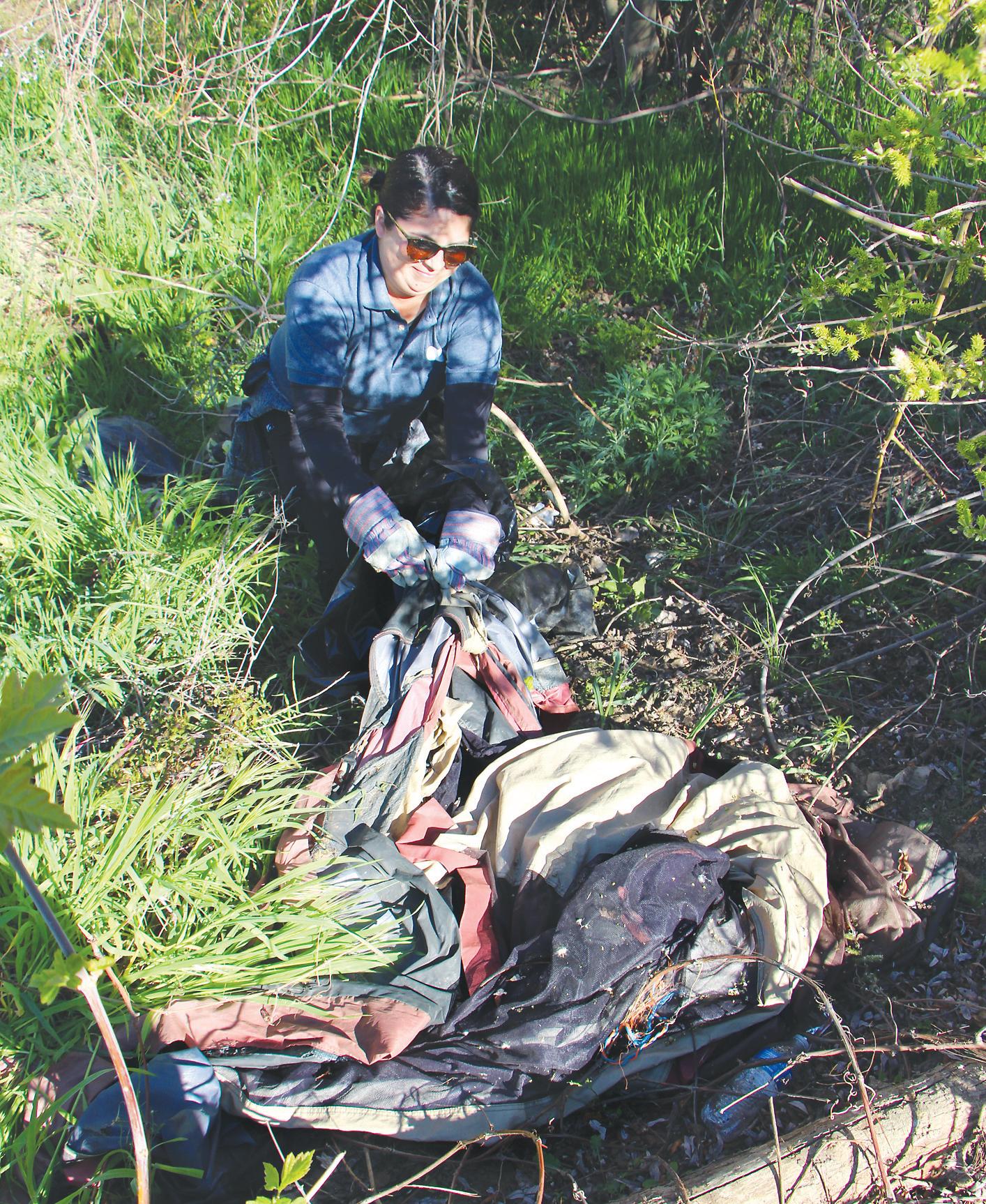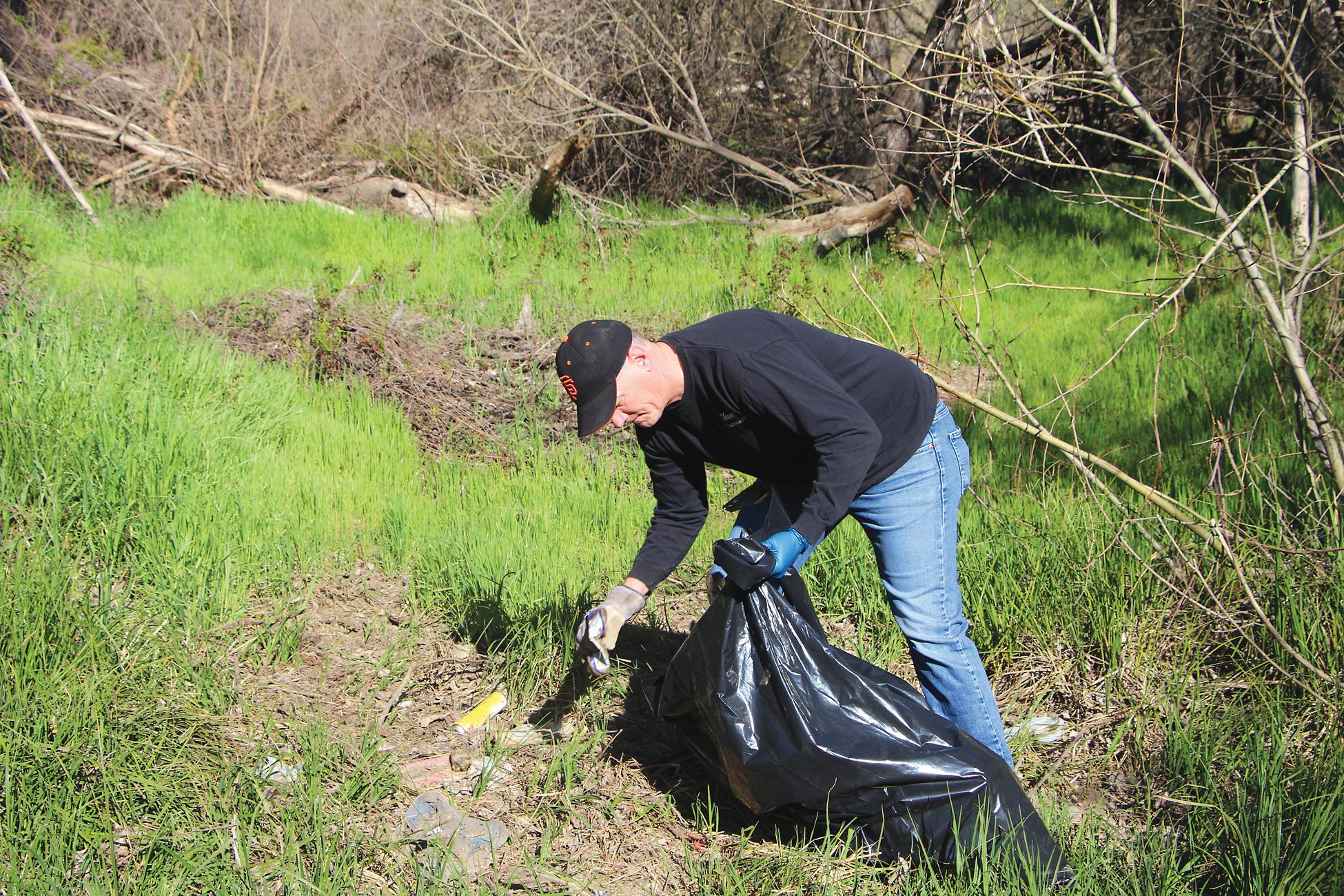
4 minute read
Nowhere To Go
Rich Desmond Photos by Mark Rakich
Katie Valenzuela

ILLEGAL CAMPING THREATENS AMERICAN RIVER PARKWAY
Iexpected a crumpled candy wrapper here, an empty beer can there, a smattering of trash to pick up on a clear morning along the American River Parkway.
What I got was the sad and staggering refuse of abandoned homeless camps. Mattresses, sleeping bags, glass bottles, food containers, bicycle tires, tarps, tents, toiletries, children’s toys, shoes, clothing and more, some half buried, most covered with muck from high and low river tides.
Sacramento Picks It Up! and the American River Parkway Foundation hold several volunteer cleanup events every week along the Sacramento and American rivers, creeks and waterways.
The work is strenuous, exhausting and fi lthy. Everyone wears long pants and heavy work gloves. Some don masks to mitigate the dust. Many carry buckets and trash-grabber sticks, which don’t work on broken, half-buried lawn chairs. You have to use your hands.
The task is seemingly endless. But the reward comes later, looking out over one small expanse of unspoiled
ARPF invited city and county leaders to participate in a cleanup and witness fi rsthand the devastation. Sacramento County Supervisors Rich Desmond, Patrick Kennedy and Don Nottoli, and City Council member Katie Valenzuela joined parkway representatives, agency staff and media to view and clean trails near Northgate Boulevard.
This was not Desmond’s fi rst cleanup. “The last time we were here, I probably picked up 200 needles,” the District 3 supervisor says. Addiction issues throughout California, including Sacramento, “make this crisis so much more diffi cult to get a handle on.”
Desmond supports ARPF and its work to protect the parkway. “I am glad the parks foundation wrote that letter,” he says. “I love the political pressure they are applying and I think they should keep doing it.
“As far as removing all the campers in one fell swoop, we would not do that until there are more resources.” Park rangers estimate 2,000 people live along the 23-mile parkway.
“That will take time and an organized effort,” Desmond says. “And ideally a location where we can direct these folks, where they can get the help they need, they can get connected to treatment, job training, housing.”
Councilmember Valenzuela believes the city and county “are all pretty earnest in working together to fi gure this out. We are earnest to work with the county to scale up services we need. Earnest to help identify locations that can work.”
COVID made everything worse, Desmond says. “The public health order said, as a result of CDC guidelines, do not disrupt homeless encampments because we don’t want to increase the spread of the disease. That resulted in a lot of camps getting entrenched over the last couple of years.”
Another challenge Desmond cites is Martin v. Boise, a 9th Circuit Court of Appeals ruling that people cannot be punished for sleeping outside on public property when there is no home or shelter available.
But Martin v. Boise “does not prevent us from moving campers from the parkway,” Desmond says. “It did not say you can camp anywhere in public, any time, in any way. It just says you cannot criminalize homelessness.”
The bigger challenge, he says, “is having more capacity for folks,” from car camping areas and permanent housing to addiction and mental health treatment. “We need to have capacity so when we do clear an encampment there is a place for people to go.”
Cathryn Rakich can be reached at crakich@surewest.net. Previous stories on local homelessness issues can be found and shared at InsideSacramento. com. Follow us on Facebook, Twitter and Instagram: @insidesacramento. n
CR
By Cathryn Rakich
landscape, no longer burdened by manmade debris.
While the cleanups focus on abandoned encampments, an increasing number of occupied camps pose environmental and safety issues to the parkway.
In January, ARPF sent a letter to Sacramento city and county representatives, demanding local leaders address the “growing concern of illegal camping along the American River Parkway.” The letter cites “fi re danger, diminished water quality and hazardous materials resulting from intravenous drug use.”
Among the demands, ARPF wants at least 750 illegal campers removed from the parkway this year and a detailed plan on how this will be accomplished. The foundation calls for funding to restore damage, such as burn scars, caused by illegal camp fi res.
The letter seeks healthy water for wildlife and humans, and additional testing for “E. coli and other bacteria attributable to human waste,” along with specifi c plans to mitigate outbreaks.
“Over the years, we have seen the effects of illegal camping get worse and worse,” says Dianna Poggetto, ARPF executive director. While 13 miles are in the city’s jurisdiction, the county owns and manages the 23-mile parkway. “The goal is for the city and county to work together in getting the unhoused the services they need.”










